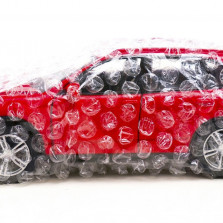
A single car insurance policy can include several types of coverage. To decide what to buy, it’s important to research the options available, which types of coverage are required and how different forms of coverage work.
Keep in mind that your policy covers you, the licensed members of your household who are listed on the policy, and usually anyone else you give permission to drive the car.
Meeting your state’s car insurance requirements
Almost every state requires you to carry a minimum amount of auto insurance to cover the cost of damage or injuries caused by your car in accidents.
The minimum car insurance requirements vary by state. Here are types of coverage that may be required where you live:
- Liability insurance
- Personal injury protection or medical payments
- Uninsured or underinsured motorist coverage
Liability insurance
Liability insurance pays for damage and injuries you cause others in accidents. All states except New Hampshire require minimum amounts of liability coverage. Bodily injury liability pays the medical expenses of others who are injured; property damage liability pays to repair or replace their cars or other damaged property.
The amount of liability coverage is usually expressed as three numbers, such as 100/300/50. Here’s how to translate that:
- $100,000 bodily injury per person
- $300,000 bodily injury per accident
- $50,000 property damage per accident.
Your car insurance will pay up to the limits on the policy. You’re on the hook for expenses that exceed those limits.
Personal injury protection or medical payments insurance
Liability insurance pays out to other people. For your own medical costs, you might consider personal injury protection (PIP) or medical payments coverage (MedPay), which may be available as part of your car insurance quotes. These pay any medical bills you or your passengers may incur if you’re injured in an accident. They can also pay for funeral costs.
One or the other is required in 16 states, but coverage works a little differently in each state. PIP can also cover lost wages and the cost to replace services normally performed by the injured person. MedPay is usually sold in smaller amounts than PIP.
Uninsured or underinsured motorist coverage
Even though most states require liability insurance there are a lot of uninsured drivers on the road. You could try to sue them if they crash into you, but they might not have the money to pay you. In that case, uninsured motorist (UM) coverage might come in handy. It pays your medical expenses if you’re injured in an accident caused by a driver who is uninsured.
There’s another closely related coverage type: Underinsured motorist (UIM) coverage pays out if the other driver doesn’t have enough liability insurance to pay all your medical expenses. The coverage kicks in once the costs exceed the other driver’s liability limits.
UM or UM/UIM is required in 19 states.
Another type of coverage, uninsured motorist property damage (UMPD), pays to repair or replace your car if an uninsured driver wrecks your vehicle. UMPD isn’t available everywhere.
Collision and comprehensive coverage
While liability insurance pays to fix others’ cars, collision and comprehensive insurance pays to fix your car or reimburse you for its current value if it’s damaged beyond repair. No state requires drivers to carry collision and comprehensive coverage, but your lender will require it if you financed or are leasing a vehicle.
- Collision insurance pays out if your car crashes into an object or another car or if it flips over.
- Comprehensive insurance pays out if your car is stolen, or damaged by anything other than car accidents. That includes damage from storms, floods, falling objects, explosions, earthquakes, vandalism or contact with an animal, such as hitting a deer.
Collision and comprehensive are usually sold together and include a deductible, which is how much of the insurance claim you’ll have to pay before your insurance pays. The higher the deductible you choose, the lower the premium for collision and comprehensive coverage.
Car insurance extras
You can choose from a variety of extra perks, which usually don’t cost much to add to a policy, but can come in handy in an emergency. You’ll need to buy collision and comprehensive to be eligible to purchase most extras, such as:
- Rental reimbursement, which pays for a rental car if your car is in the shop following a covered collision or comprehensive claim.
- Roadside assistance or towing insurance, which provides help if you need a battery jump, flat tire changed or tow to a repair shop after a mechanical breakdown.
- Full glass coverage, which pays to repair or replace chipped or broken window glass, without a deductible.
Comparing car insurance quotes for coverage
Once you understand the types of coverage available, decide the kinds and levels of insurance protection you need.

